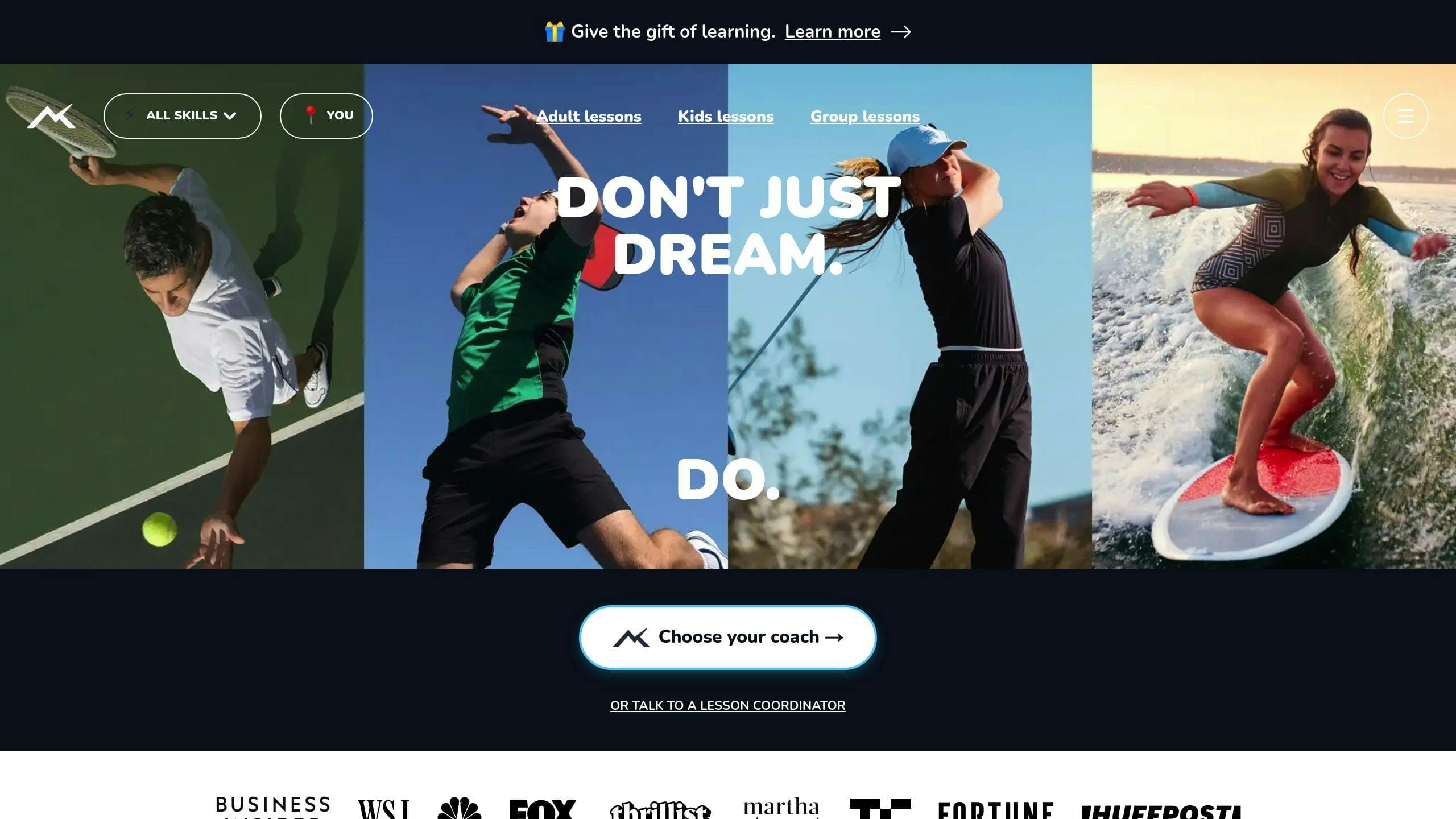How Coaches Help Learners Overcome Plateaus

Introduction
Learning plateaus can feel frustrating - progress slows or stops, even with consistent effort. But they’re a normal part of skill development, and coaches are key to breaking through them. Here’s how they help:
Identify the Problem: Coaches pinpoint the root cause, like cognitive overload, lack of challenge, or repetitive habits.
Personalized Strategies: They adjust training plans, set new SMART goals, and break complex tasks into smaller steps.
Constructive Feedback: Regular, targeted feedback helps correct mistakes and build confidence.
Mental Motivation: Coaches reframe setbacks as opportunities, track progress, and celebrate wins to keep learners motivated.
Plateaus are temporary, and with the right coach, they can become stepping stones for growth. Platforms like TeachMe.To connect learners with expert coaches to guide them through these challenges.
Recognizing and Solving Plateaus
How to Spot a Plateau
Plateaus in learning are often easy to recognize. They show up as repeated mistakes, stalled improvement, and a drop in motivation, even with consistent practice. This can lead to frustration and lower confidence, making it important to address the situation quickly.
Once you notice these signs, it’s time to take a step back, reassess your goals, and adjust your strategy to get back on track.
Reevaluating Goals and Training Plans
When progress comes to a halt, it’s essential to revisit your goals and training methods. Coaches often work with learners to review what’s working and what’s not. This might involve setting new SMART goals - those that are Specific, Measurable, Achievable, Relevant, and Time-bound - to better fit the learner’s current needs.
By pinpointing skill gaps and breaking progress into manageable milestones, coaches can create a clear path forward. Regular check-ins and adjustments ensure the plan stays effective.
Using Feedback to Improve
Feedback is a powerful tool for breaking through plateaus. Coaches provide targeted advice to tackle specific problems. For example, in sports like tennis or golf, video analysis can reveal technical flaws that learners might not notice on their own [1]. This kind of feedback combines regular evaluations, actionable guidance, and encouragement to push learners beyond their current limits.
To help learners grow, coaches may design challenges that require stepping outside their comfort zones. Platforms like TeachMe.To connect learners with skilled coaches who offer tailored feedback and strategies to overcome these obstacles. Whether it’s golf, tennis, or another activity, these personalized approaches help learners move past their plateaus and continue improving.
Steps Coaches Take to Help Learners Improve
Focusing on Specific Skills
Breaking through a plateau often means narrowing the focus. Coaches tackle this by breaking down complex skills into smaller, more manageable parts. This makes it easier for learners to master each piece before moving on, creating a steady path forward without overwhelming them.
Take golf, for example. Coaches might concentrate on swing mechanics, using specific drills to fine-tune movements and build muscle memory. By addressing one element at a time, learners improve their technique in a structured way.
Building Confidence and Mental Strength
Staying mentally strong is just as important as honing technical skills. Coaches work with learners to build tools for motivation and self-belief, framing challenges as chances to grow rather than setbacks.
They often highlight past achievements to remind learners of their capabilities, helping them see obstacles as temporary. This shift in perspective can keep learners moving forward, even during tough periods.
Technique | Purpose |
|---|---|
Progress Documentation | Monitor growth and trends |
Achievement Recognition | Reinforce self-confidence |
Mindset Reframing | Challenge limiting beliefs |
Encouraging and Supporting Learners
Coaches know that emotional support is just as critical as technical advice. By fostering a positive environment and scheduling regular check-ins, they help learners navigate frustrations and stay on track.
"A coach might schedule regular progress meetings with a learner to discuss their feelings and concerns, offering guidance and encouragement to help them stay motivated."
Setting realistic expectations is another key part of a coach’s role. Plateaus are normal, and with the right mindset, they can lead to breakthroughs. Platforms like TeachMe.To connect learners with coaches who balance emotional support with technical expertise, helping learners achieve consistent progress.
Once the plateau is behind them, the focus shifts to maintaining that forward momentum.
How to Deal With the Language Learning Plateau
Staying on Track After Overcoming a Plateau
Breaking out of a plateau is only the first step - staying on track requires consistent effort and planning. Coaches play a key role in helping learners maintain their progress and avoid slipping back into old patterns.
Crafting Clear Learning Plans
To keep progress steady, coaches design structured learning plans using SMART goals - Specific, Measurable, Achievable, Relevant, and Time-bound. These plans often include regular check-ins, like bi-weekly video reviews or six-week skill benchmarks, to ensure progress is both visible and manageable.
Celebrating Wins Along the Way
Acknowledging even small victories boosts confidence and reinforces positive habits. Coaches work with learners to recognize and celebrate milestones after breaking through a plateau, helping to maintain momentum and motivation.
"Much of addressing plateaus and generally helping players grow is reading players and understanding where they are comfort-wise." - Kyle Weisbrod, Coach, Ultiworld [4]
By highlighting achievements, learners are more likely to stay motivated and take on new challenges with enthusiasm.
Maintaining a Growth Mindset
Coaches emphasize the importance of seeing challenges as opportunities to improve. They introduce variety into training sessions to keep things engaging and prevent stagnation. Regular feedback and adjustments to training plans ensure that the learning process stays dynamic and aligns with the learner's evolving needs.
Plateaus Are Part of the Learning Process
Key Takeaways
Hitting a learning plateau is tough, but it’s a normal part of improving any skill. Coaches play a big role in helping you push past these moments. They pinpoint areas that need work, create customized plans, and blend technical and mental strategies to help you grow. A good coach also knows how to strike the right balance - challenging you just enough to build both your skills and your confidence.
A Word of Encouragement
Plateaus aren’t roadblocks - they’re chances to sharpen your abilities and tackle more complex techniques. Stay committed, experiment with different approaches, and you’ll see progress. If you’re feeling stuck, working with a coach who understands your goals can provide the boost you need.
How TeachMe.To Can Support Your Journey

Platforms like TeachMe.To connect you with expert coaches who know how to break through plateaus. Whether you’re just starting out or tackling advanced challenges, these coaches offer personalized guidance to keep you moving forward. From golf to tennis to pickleball, TeachMe.To helps match you with the right coach to navigate the tough spots and continue your learning journey.
FAQs
How can we overcome plateaus in learning?
Plateaus are a common part of the learning process, but specific strategies can help you move past them.
First, identify the root cause. Is it a lack of variety, repetitive routines, or technical challenges? Once you know the issue, you can address it directly.
Here are a few ways to break through plateaus:
Change up your practice intensity.
Experiment with new drills or exercises.
Break complex skills into smaller, manageable parts.
Incorporate different methods or styles of learning.
Beyond technique, mindset plays a big role. Adopting a growth mindset helps you see plateaus as temporary hurdles rather than permanent roadblocks [1].
"Learning plateaus are a natural part of the learning process, but they don't have to halt your progress. By identifying the cause, implementing effective strategies, and maintaining motivation, you can overcome plateaus and continue to achieve your learning goals." [3]
Working with a coach can also make a big difference. Coaches offer expert feedback, pinpoint skill gaps, and provide tailored solutions to keep you on track. Celebrating small wins along the way can help maintain motivation and build momentum [5][2].
Platforms like TeachMe.To connect learners with experienced coaches for personalized support. With the right strategies and expert guidance, plateaus can become opportunities for growth.
